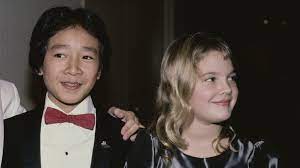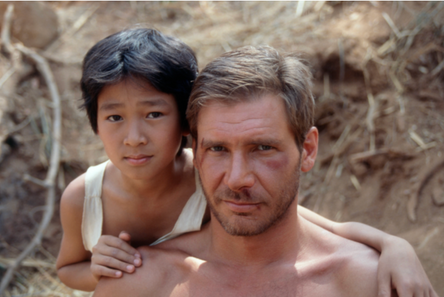Ke Huy Quan's Path to Hollywood: From Adversity to Influence
- Anela Picotte
- Jan 14, 2024
- 6 min read
Updated: Jan 14, 2024
March 2023
Many aspiring actors long admire the artistry and stardom emulating from the cinematic stage, going through difficult journeys searching for breaks as did Ke Huy Quan. With dedication, some are lucky enough to achieve these dreams, now able to carve paths and live to inspire others.
Born in 1971 in Ho Chi Minh City, Vietnam, Jonathan Luke Ke Huy Quan immediately entered the world in a tumultuous situation with his eight siblings. When Quan was just four years old, the North Vietnamese invaded the south, taking control, and causing the family to flee.
Though his father ran a plastic bag company and his mother owned a shop herself, the defeat of the Army of the Republic of Vietnam in the Fall of Saigon forced Quan’s family to leave the country and be selected for political asylum. Losing everything in this dispute, Quan with his father and five siblings fled to Hong Kong while his mother and remaining three siblings fled to Malaysia.
Quan’s Hong Kong ride was difficult in itself, packing upwards of 3,000 people on a single ship brimming with refugees.
After reuniting and living in a Hong Kong refugee camp, the family was picked for the Refugee Admissions Program in 1979 where they were directed to America. Settling into California’s Chinatown allowed Quan to attend Sunland- Tujunga’s Mount Gleason Junior High School in Los Angeles and later Alhambra High School where he became a child actor.
At just age 12, Quan starred in Indiana Jones and the Temple of Doom as Harrison Ford’s sidekick Short Round, being found through an open casting call where he wasn’t even auditioning but supporting his hopeful younger brother. Quan noted to The Guardian some of his original hardships.
“I remember doing a really bad job because my English comprehension was very minimal at the time. The next day, we got a call from Spielberg’s office,” recalled Quan. “My mum thought it was a really fancy meeting and put me in this ridiculous three-piece suit. Steven noticed how uncomfortable I was. He said ‘Ke, I would love for you to come back the next day, but wear something comfortable. It was one of the happiest times of my life.”
That interaction was immediately followed by young Quan flying to Sri Lanka to film, before his teenage years already being part of projects with the legendary director. After filming each day, Quan noted how the cast would have dinner gatherings together, also hanging in the hotel’s swimming pool.
While Quan would watch Harrison Ford swim his laps, Ford one day realized it was because of Quan’s inability to swim, prompting Ford to teach him and creating a lasting connection.
“That’s how we bonded. Everybody was so friendly. That was kind of set that George [Lucas] and Steve would run; there was never any screaming. There was always laughter and peace.”
In 1985, the year after Indiana Jones, Spielberg helped young Quan feature in The Goonies as “Data”. He soon expanded past American film, appearing in the Taiwanese It Takes a Thief in 1986 and again the next year appearing in the Japanese film Passengers.
Quan has a history of friendly relationships with his costars as during Covid, The Goonies cast reunited virtually for charity. Every Christmas, Quan also sends Spielberg a present giving thanks for his first job and constant reliable companionship, but his luck hit a standstill.
Through tough parents who set up limitations on cursing and cramming the eleven-member family around the dinner table, he was constantly reminded to stay clean from drugs. This, however, is also not the only struggle actors face no matter their resume or age.
Being Vietnamese refugees and of Chinese descent, the Quan family and Ke Huy himself faced adversity being part of one the smallest demographics in the United States population as Asian Americans. Also, the market for Asian actors became slim as Quan painfully found out.
“I always felt like an outsider, especially when I was growing up. I had major identity issues. We were refugees. Nobody wanted us and they would call us ‘fresh off the boat’. To go from starring in one of the biggest movies in 1984 gave me and my family hope, courage and a lot of freedom.”
With his earnings, the Quan family was able to buy a house and pay off previous debts of his parents. As a teenager, Quan changed his name to Jonathan Ke Quan after also being the subject of constant professional mispronunciations of his name, in most cases his being the only name struggled with. When later reigniting his career, it was important to him to reinstate his birth name and wear it proudly but only after a break in acting.
After his two incredibly iconic film features in the 80s, his career lost traction. Despite the few smaller roles in low-impact TV shows and international films, Quan was faced with the reality of Hollywood's scarcity of Asian actor roles. In his hunger to work, he was often forced to take demeaning stereotypical roles giving minimal credit to his abilities.
Following a time of no auditions, Quan attempted an audition for a Vietcong solder with only two lines. After an anxious week waiting for a callback, he got the call but not the role.
“I remember not having one single audition for an entire year. I thought: ‘What am I doing? I can’t be waiting for the phone to ring every day.’ I was 23 at the time. I was so lost. I just didn’t see a future for myself as an actor.”
Soon, he worked alongside action choreographer Corey Yuen for films like X-Men, additionally serving as stunt rigger and translator. Working on another Hong Kong romance film, director Wong Kar-wai set Quan up with his future wife, now married for 22 years.
While watching Crazy Rich Asians, Quan realized a finally growing availability of roles for Asian actors, prompting him to decide to retry his once-rewarded passion. A persistent inkling eventually pushed him to give another shot to his career.
“I felt there was a big part of me missing and I didn’t know what that was. I noticed Asian actors were getting more opportunities, and I began to harbor this dream of getting back into acting, but it took a lot of courage to give voice to that dream. One day I decided; if I don’t do this, I will regret it.” said Quan.
He was right.
Michelle Yeoh, the lead character and costar of Quan’s re-breaking out film Everything Everywhere All at Once commented on his comeback to Movieweb. She plays his wife in the funky film exploring the multiverse, a smash hit at this year’s Oscars.
“It’s fantastic, you know. It’s not about being rediscovered. He was always there, but he didn’t have the role to play, right? If there had been more roles like this, he could have come back sooner ’cause his talent didn’t go away. So I am very proud of Ke. He saw the opportunity and he ran for it.”
To People Magazine, Quan also noted Yeoh’s influence on him, helping him along the way to reigniting his dreams.
“She guided me. I haven't done this for a long time. I don't think we could have done this movie without her.”
One of Everything Everywhere’s directors and writers Dan Kwan noted to Deadline the process of Quan’s casting.
“Maybe his short acting career doesn’t point to what he could do in this movie, but when you really dig into his life and what he’s accomplished, he actually becomes pretty obvious.”
After looking into his past work, both Kwan and his partner Daniel Scheinert researched Quan and wished him to audition.
“He was the first person we auditioned, actually, and he immediately won our hearts over. It was amazing actually, to meet him for the first time because he was so excited.”
Altogether, Ke Huy Quan was part of countless childhoods around the world whether realized or not, largely getting a start from the icons who believed in him and his persistence in his passions. At this year’s Oscars, he not only noted his journey but was incredibly grateful for Everything Everywhere All at Once’s unbelievable success.
At this year's 95th Academy Awards, the film garnered eleven nominations, winning seven and topping all other competitors in the running. Quan himself won the Best Supporting Actor Oscar and Golden Globe, in his acceptance speech bringing his whole story together.
“My mom is 84 years old and she’s at home watching. Mom, I just want an Oscar. My journey started on a boat. I spent a year in a refugee camp, and somehow I ended up here, on Hollywood’s biggest stage. They say stories like this only happen in the movies. I cannot believe it’s happening to me. This is the American Dream... Dreams are something you have to believe in. I almost gave up on mine. To all of you out there, please keep your dreams alive.”








Comentarios